|
"Someday you'll understand the path I've chosen. Today, I answer "No" and "No" to set my conscience free. My allegiance must lie first with me." No, these weren't words spoken by my own father, although they sound very much like something he would say. These are lyrics sung by Tatsuo Kimura (Christopheren Nomura) as he reacts to the dehumanizing Loyalty Questionnaire given to the Japanese American Internees in Allegiance's powerful, titular song. Now, you may not realize it, but there are so many absolutely revolutionary things in that previous statement, specifically revolutionary for Asian/Asian American representation in the arts. And that's just a small part of Allegiance's legacy. Keep reading to find out what I mean. (Spoilers ahead, but you should learn the main plot points if you haven't. This is our country's history.) And don't miss Allegiance at your local movie theater on December 13! Click here for details. First, let's talk about Tatsuo. He's worked hard his entire life on his artichoke farm in Salinas, California for his kids, Keiko (or Kei, Lea Salonga) and Sam (or Sammy, Telly Leung). He still quietly mourns the death of his wife. Pause. Traditionally, what have been the roles available for Asian men on Broadway? Miss Saigon's Engineer is a mega-flashy, star-creating role, but his main characteristic is that he absolutely hates being Asian. ("Why was a born of a race that thinks only of rice and hates entrepeneurs?") What about The King and I? The recent revival certainly did a lot of good in terms of The King; four incredible actors who each had distinct portrayals. But it still is one of those roles where the Asian man is exotic and other-worldly. (Take a look at census data; heck, look around you. Asian men don't just exist oceans away; Asian men are HERE.) Now let's look back at Tatsuo and Allegiance and see what an Asian male role could be. Play. 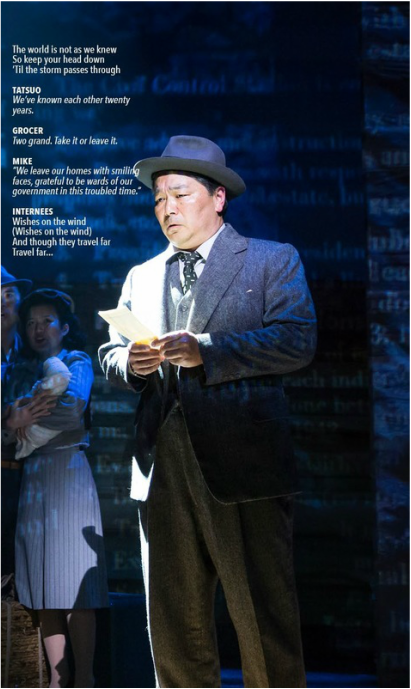 Tatsuo is very proud of his Japanese heritage and wants his kids to stay connected to their roots. (In Sammy's case, that's easier said than done.) He is completely appalled that the country he's called home for so many years has put him behind barbed wire. At first, he keeps his head down and puts up with Heart Mountain camp life as to not cause greater trouble. But the question of his loyalty finally pushes him over the edge, and he refuses to sacrifice his dignity despite the threat of hard labor away from his family. That is a beautiful role for Asian actors to play one day. And that's not the only incredible role Allegiance created for Asian/Asian-American men; the show is full of them! Let's continue with another man of the Kimura Family. 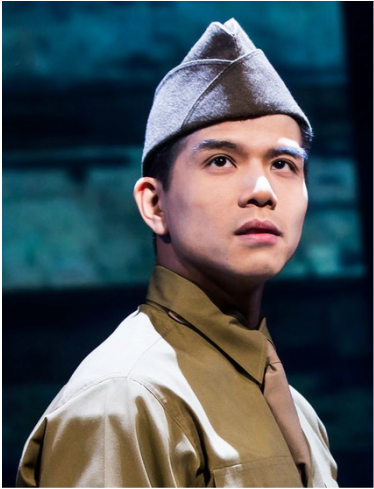 There's Sam, Tatsuo's son. (Young Sam is played by Leung, and the older Sam is played by George Takei.) He's young and full of pep and pride. Unfortunately for his father, Sammy doesn't get accepted into law school. Sammy on the other hand is tired of trying to be the smart, successful kid. When war is declared on Japan, his first instinct is to enlist in the army. He and all the other Japanese American boys are turned away. It is definitely a shot to Sammy's pride. After being accused of not being American enough, Sammy actually blooms into an incredible leader among the young people in the camp. He starts petitions. He organizes events. He helps out in the infirmary. And when the opportunity to enlist finally arrives, he does not hesitate one bit. His father is furious that his son is willing to die for the people who watch them day and night. But Sammy sees an opportunity to prove his loyalty and allegiance and an opportunity to free his family. Perhaps the most groundbreaking thing about Sammy's character is...  Yes, ladies and gentlemen! He's not just a male lead; Sammy is a male romantic lead. He gets to have a crush. He gets to flirt with her. He gets to have sweet moments with her. And he eventually falls in love with Nurse Hannah. Hannah Campbell (Katie Rose Clarke). I'm bringing this up because race is definitely a character in this show. We rarely see interracial relationships on stage, let alone relationships with an Asian or Asian American man. And we can't use the excuse that the number of interracial relationships has only gone up recently. Allegiance takes place in the 1940's. This isn't anything new. But just when you thought Allegiance couldn't be any better, there's not just one romantic leading man. Enter Frankie Suzuki. He's cool. He's charming. And he's on a mission to win Kei's heart. He's also everything Sammy couldn't be for his father, which Sammy's not happy about. Before being forced into Heart Mountain, Frankie (Michael K. Lee) was a law student at USC. His parents ran a Japanese language school, so he's able to converse fluently with Tatsuo and Ojii-chan (Kei and Sammy's grandfather, also played by George Takei). Sammy on the other hand has always had trouble with his Japanese. Frankie also has a lot of guts. Where Sammy believes they all need to prove their loyalty, Frankie thinks that's all a load of garbage (which also happens to be where his Loyalty Questionnaire ends up). He refuses to serve in the army while his rights as an American citizen are not being honored. 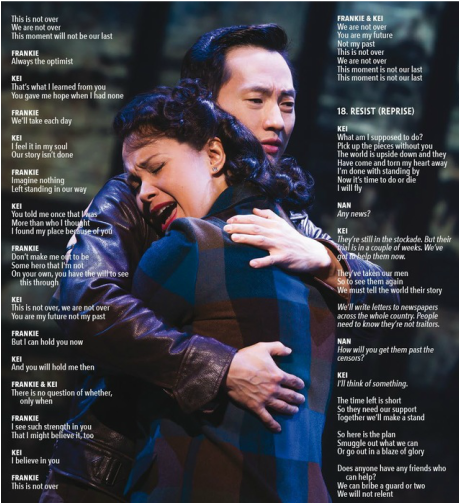 The character of Frankie is based on Frank Emi, a real leader of the draft resistance at Heart Mountain. Refusing neither to serve in the armed forces nor to confess loyalty to the Japanese Emperor, Emi shared alternate answers to controversial questions #27 and #28 of the Loyalty Questionnaire. Aside from his incarceration in the camps, Emi spent over a year in a federal penitentiary after being convicted of conspiracy and violation of the Selective Service Act. The real Frank Emi, entered camp with his wife and baby daughter. Frankie Suzuki arrives at Heart Mountain and finds himself in a barrack with ten other single men. Frankie and Kei become a sort of power couple for the resistance. When Frankie and the other resistors are sent to the penitentiary, Kei is able to lead the women in a writing campaign to shorten their sentence. Wow. An Asian American role based on a real man. And that's just one of them in Allegiance. Let's step away from the romantic leads and talk about Mike Masaoka. 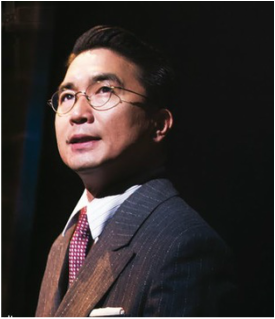 Mike Masaoka (Greg Watanabe) is one of the most controversial figures in Japanese American history. As a leader of the Japanese American Citizens League, Masaoka ended up as the liaison between the Japanese Americans and the War Relocation Authority. This one man had to be the voice of two different generations of people who all held different beliefs. The fate of over 100,000 people was put in his hands. His actions had the power to change lives and end lives. In terms of Asian roles in musical theater, I believe that of Mike Masaoka is one of the most difficult. Part of that difficulty lies in the fact that the role is completely spoken. When emotions heighten, Masaoka cannot break into song. Instead, his thoughts are delivered through powerful monologues. The fact that Masaoka does not communicate through song further distances him from the rest of the Japanese American community. The other difficulty is the fact that the audience must both sympathize with him and see why he was hated by so many. He's not necessarily the villain, but there's no denying what could have been avoided had he not made certain decisions. Masaoka never had to endure living in a camp, but he definitely did not come out of the period unscathed. If you asked me to name another show with this many big roles for Asian/Asian American men, I probably wouldn't be able to give you an answer. I bet other shows exist; there's just been so little talk about shows like this that I'd have to do a lot of digging. (I just discovered a show called Making Tracks the other day by accident. I literally had no idea about its existence when I started writing this. If you liked Rent, find a copy of Making Track's concept album and give it a listen. )
Allegiance has meant a lot to me for so many years. It still means a lot to me, and I definitely have more blog posts to write on it. I wanted to get this out because I haven't seen many people talking about the Asian/Asian American male roles that this show created. Sure, it might make the show hard for a high school to perform, but when you think about the shows most commonly performed in high schools, it makes sense why there have always been so few Asian American students in theater programs. Please don't miss Allegiance when it hits movie theaters on December 13, 2016.
14 Comments
|
AuthorJust me, Marianne. Check out the About page for more about me. Archives |
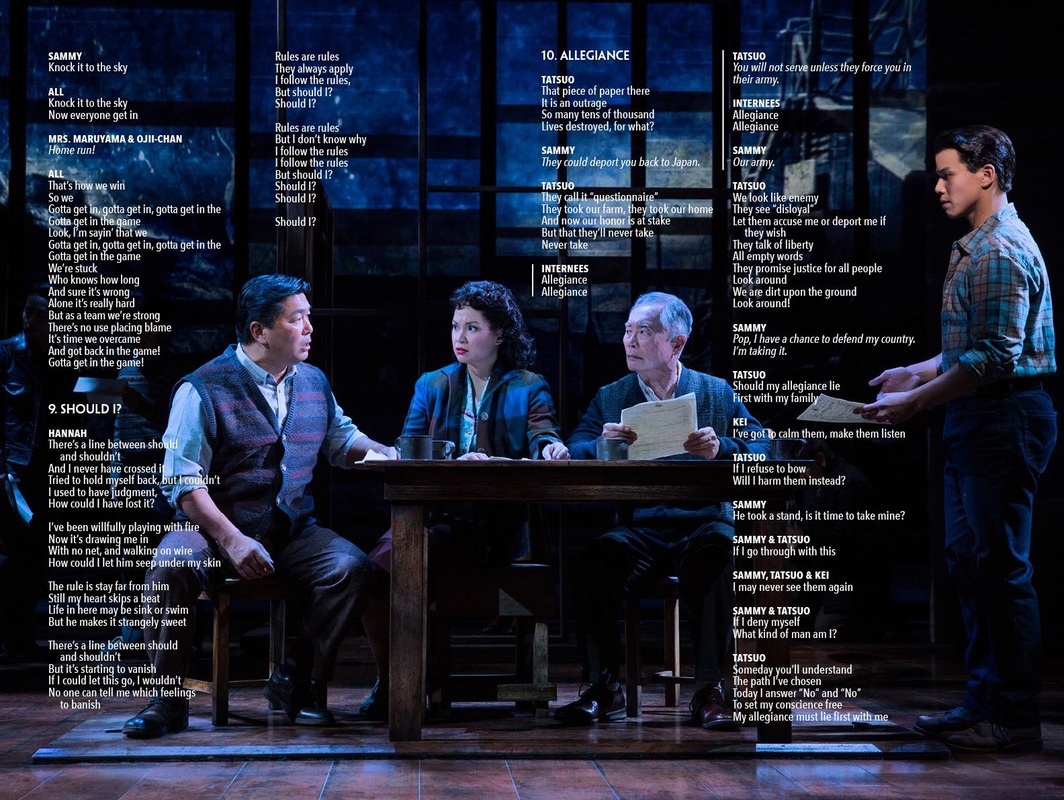
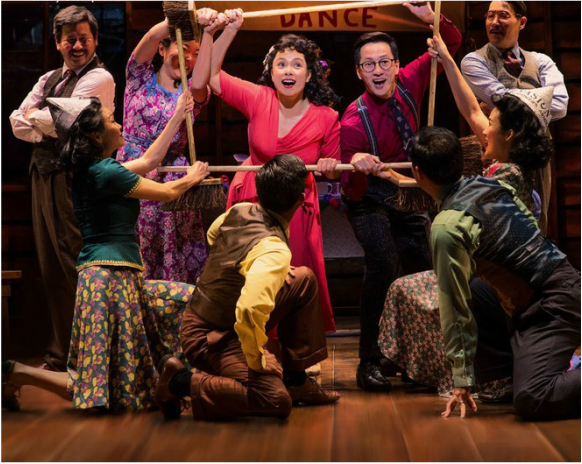
 RSS Feed
RSS Feed